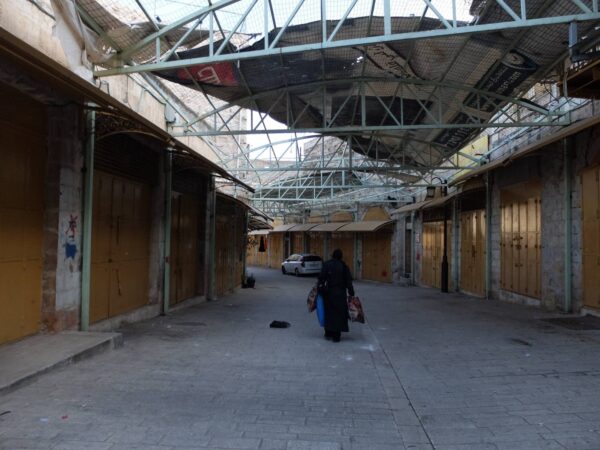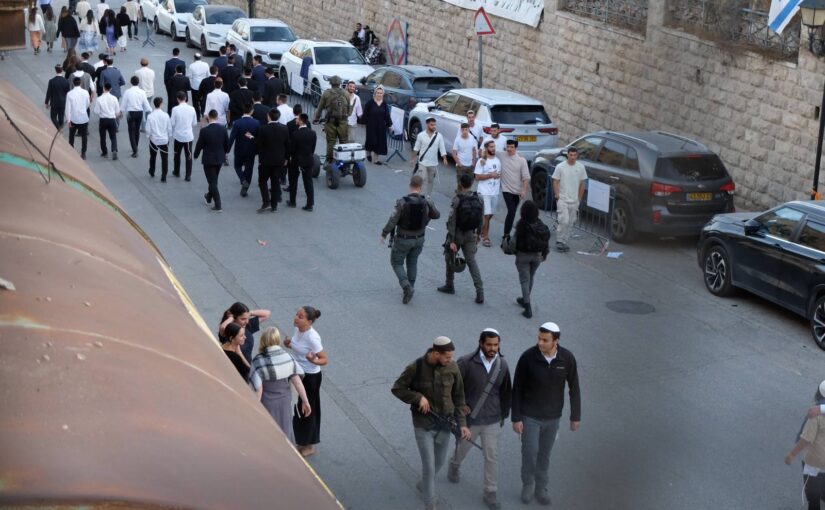November 21/ 22 – Al-Khalil
Music, songs, dancing, prayers and alcohol. This could chracterize a common religious festival anywhere – were it not being used as an excuse for Israeli settlers to attack and raid the Palestinian community, which is already living under segregation since 1997, in the city known as al-Khalil for the Palestinians and Hebron for the Israeli.
As it happens every year, tens of thousands of settlers and Zionists from abroad gathered in the city on Friday, Nov. 22, and Saturday, Nov. 23, to celebrate “Shabbat Chayei Sarah”, coinciding with the Torah reading of the story of Sarah (one of the wives of Abraham). Sarah is believed to be buried in what Israelis call the Cave of the Patriarchs. Commonly known as “Sarah Day”, this event has for years turned into a kind of pogrom against Palestinians living in Al-Khalil.
In previous years, settlers have attacked Palestinian homes, cars and stores, attempted to start fires, and done massive marches which start from the Shuhada Street (almost completely closed to Palestinians), cross check-points and spill into the Palestinian part of the city. The Sarah’s Sabbath is one of those days that worsen the already oppressive living conditions for Palestinians living in al-Khalil, conditions which have become almost impossible since October 7. The entire area was blocked off to Palestinians for the weekend – the check-points were completely closed, preventing passage from one side of the city to the other.
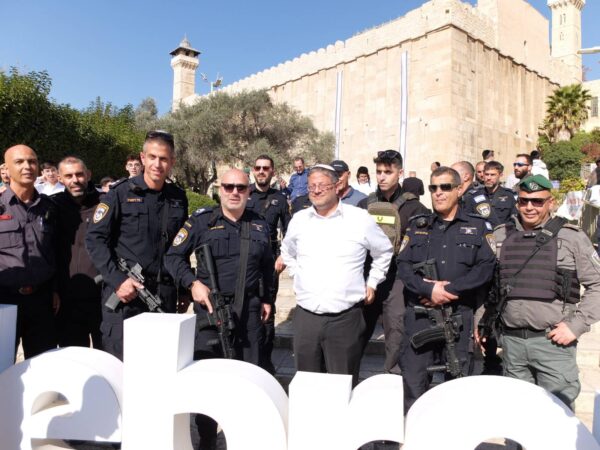
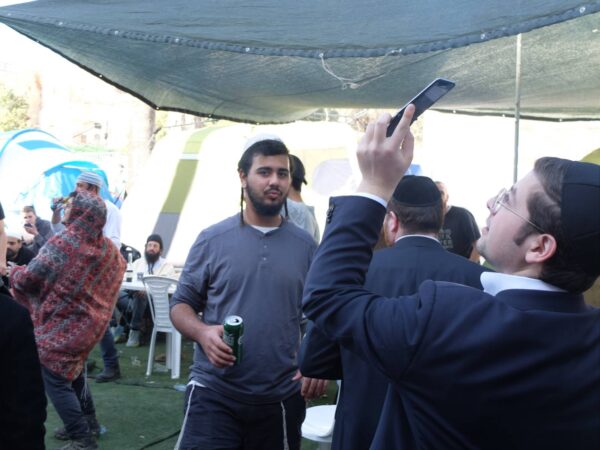
Settlers began arriving the day before (Nov. 21); buses from settlements throughout the West Bank and ’48 (Israel proper) brought thousands of young people, families, and military personnel to camp in tents around the Ibrahimi Mosque and Al-Shuhada Street. The celebration began here, around what’s considered a sacred historical monument built over the cavern containing the tombs of Abraham, his wife Sarah, and sons Isaac and Jacob. Al-Shuhada Street has been almost inaccessible to Palestinians for 27 years now; it was closed by the military after the so-called Hebron Protocol in 1997 and the beginning of the geographic apartheid of al-Khalil.
On Friday evening, groups of settlers carried out night marches in the Jaber neighborhood and Palestinian-inhabited areas near the Kiryat Arba settlement, chanting slogans and insults against Arabs and Palestinians. Also present was Israeli National Security Minister Itamar Ben-Gvir, leader of the far-right Otzma Yehudit party, who was celebrating Sarah’s Sabbath surrounded by worshippers in the afternoon and leading a group of settlers in chanting anti-Arab slogans in the evening. Ben Gvir is one of about eight thousand inhabitants of the huge illegal settlement of Kiryat Arba, known for its extremist and violent views. That settlement was also the hometown of Baruch Kopel Goldstein, the Israeli-American terrorist who in 1994 opened fire on hundreds of Muslims praying in the Ibrahimi Mosque, killing 29 people and wounding 125. Ben Gvir is known to keep an image of the terrorist in his living room.
On Saturday, a number of youth groups gathered in one of the main outposts inside the city, the Beit Romano settlement. After gathering beyond the gate that closes al-Shuhada, they began throwing stones and shouting insults and slogans against Arabs. In years prior, the military allowed and facilitated a march that invaded the old city, forcing Palestinian merchants to close their stalls and barricade themselves in their homes for fear of settler violence.
This year that particular march was not held, perhaps because of the current political situation. “Fortunately, there was little violence this year,” confirmed B., a member of a local human rights association. “But life in al-Khalil is becoming more and more difficult,” B. continued. “We live in apartheid, and since October 7 things have gotten even worse. They open and close the city as they want. After the beginning of the conflict, for ten consecutive days we were forced indoors with one hour a day when we could go out.”
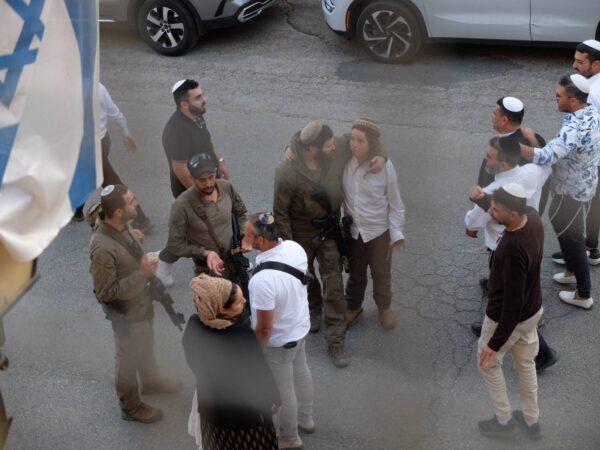
Hebron is in fact a divided city, a Palestine in miniature: metal turnstiles, walls and at least 28 check-points separate the Israeli-controlled H2 zone from the Palestinian Authority-held H1. Some 33,000 Palestinians live in the Israeli state-controlled zone, which in addition to dividing families and communities, forces thousands of people to pass through lengthy security checks on a daily basis and endure mistreatment, abuse and arbitrary closures of entire neighborhoods. OCHA’s September 2023 survey found that there were a total of 80 blockades inside the city (including the 28 “constantly-staffed” checkpoints), but since October 7 they have reportedly increased to 113 in the Old City and 180 throughout Hebron.
This is a true internal apartheid imposed upon Palestinians in the West Bank. Painting a picture of what apartheid is like in Hebron, B. narrated: “From my home in the Jaber neighborhood (H2 area), it would take me five minutes to walk to the mosque. Now I don’t go there anymore, I would have to go through eight checkpoints, between road closures and check-points. Their goal is to tire us out, to get us out of these neighborhoods.” He spoke of “voiceless displacement”, the silent removal of Palestinians because of the continued abuse, violence, and economic hardship Palestinians are forced to endure.
“Since 2000, since the beginning of the walls and check-points, more than 580 stores have
been closed due to military orders, and more than 1,800 stores have suffered huge economic repercussions or closed due to the limited mobility of people in the city,” B. added. In addition to the suffering associated with harassment and endless waiting at check-points, there are raids, arrests, and arbitrary detentions. “I too have been forced in prison, like almost everyone in Palestine… That’s the Zionist ideology’s way of doing things,” related B. “They do things gradually, they try to change the demographics of the neighborhoods. They make people leave quietly because they force them into a non-life. And then they take everything.”
There are about 700 settlers living in the Old City, protected by 2,300 soldiers. “For every settler there are three soldiers: that gives the idea of the situation,” said B., speaking of the completely militarized city. And now the settlers have donned a uniform and become military themselves, resulting in increased violence toward Palestinians. “Al-Khalil is the only city in the West Bank where settlements are also inside the city. And they are trying to enlarge the settlements all the time.”
Al-Khalil: a city, a small Palestine.
